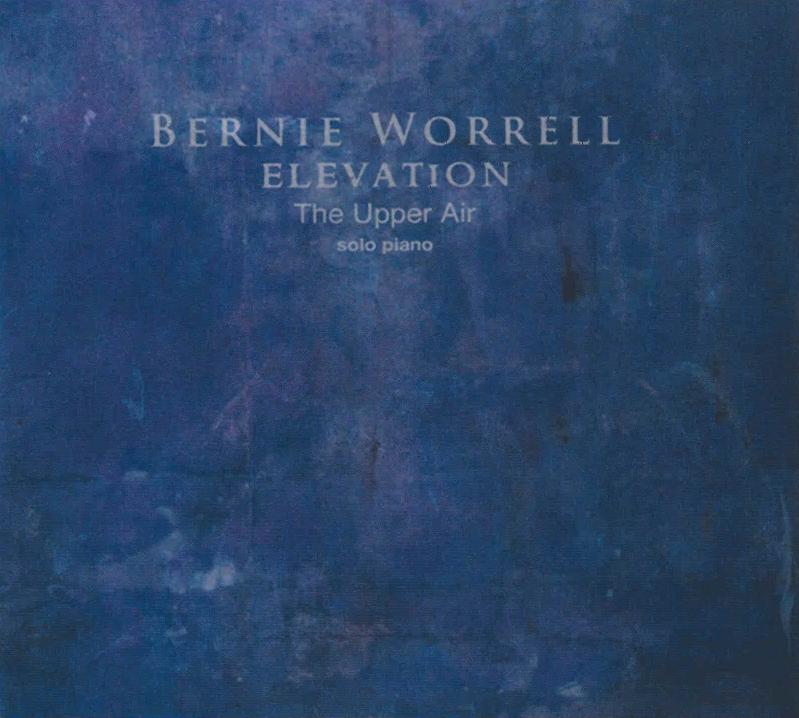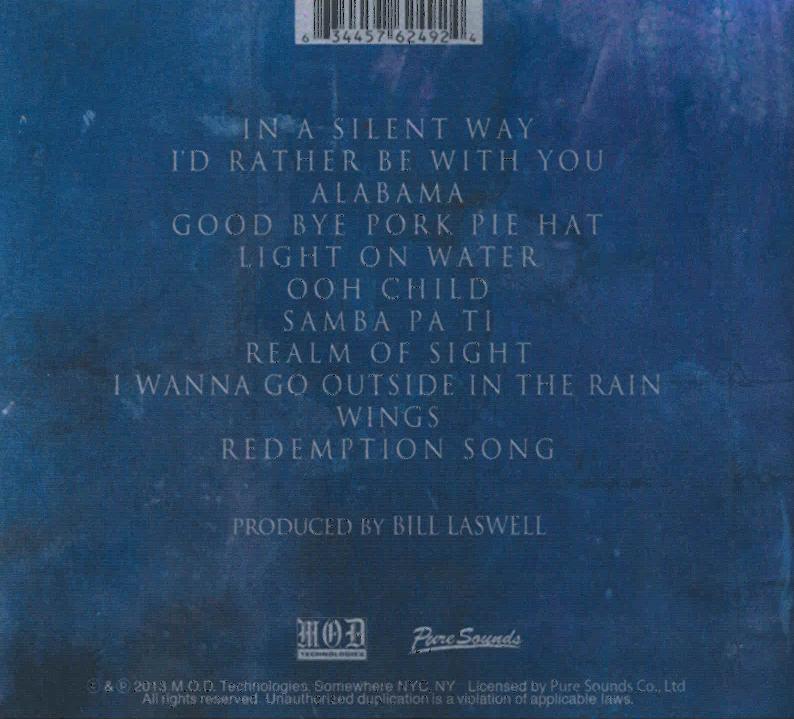BERNIE WORRELL




1/ In a Silent Way (Zawinul) 5.41
2/ I'd Rather Be With You (Clinton,Collins,Cooper) 4.21
3/ Alabama (Coltrane) 5.38
4/ Good Bye Pork Pie Hat (Mingus) 4.26
5/ Light On Water (Worrell) 4.30
6/ Ooh Child (Vincent) 5.46
7/ Samba Pa Ti (Santana) 4.54
8/ Realm of Sight (Worrell) 3.59
9/ I Wanna Go Outside In the Rain (Hester) 5.01
10/ Wings (Worrell) 4.23
11/ Redemption Song (Marley) 4.41
Recorded at The Barber Shop Studios, Hopatcong, New Jersey
Engineering by Jason Corsaro
Studio Coordination at The Barber Shop: Ryan Barber
Assistant Engineer: Jeremy Gillespie with James Dellatacoma
Mixed at Orange Music, West Orange, New Jersey
Mix Engineer: Robert Musso with James Dellatacoma
Produced by Bill Laswell
Executive Producers: Kohno Ryuji and Giacomo Bruzzo
Package Design: Yoko Yamabe@Rand Design
M.O.D. Support: Dave Brunelle
M.O.D. Technologies: Yoko Yamabe
Mastered by Michael Fossenkemper at Turtle Tone Studios, NYC
Bernie Worrell: piano.
2013 - Pure Sounds/M.O.D. Technologies (USA), MOD0012 (CD)
But there it is. Gasp. A solo acoustic piano outing by the keyboardist that fueled the music of George Clinton, Bootsy Collins, Rolling Stones, Talking Heads, Lee "Scratch" Perry, and many, many other bands. The classically trained, Juilliard and New England Conservatory of Music educated pianist has long been a collaborator with bassist Bill Laswell, performing in the projects Method Of Defiance, Praxis, and Material.
Produced by Laswell, the music displays a ruminative, and often lost-in- thought meditative sound. Worrell draws from touchstones of his musical past and also writes three penetrating and sensitive pieces. He opens with Joe Zawinul's "In A Silent Way" that sounds closer to the original heard on Zawinul (Atlantic, 1971) than it does under Miles Davis' treatment. His approach here is quite sentimental, but more affectionate than nostalgic.
He runs through a touching version of Charles Mingus' "Good Bye Pork Pie Hat" that conjures the Lester Young that composer had in mind, extrapolating a classical feel to his improvisation. John Coltrane's "Alabama" is played with a thundering left hand (the hand of God?) and the compassion of a nation. Then there is the one-hit wonder soul song "Ooh Child" by The Five Stairsteps that is instantly recognizable, yet slowed to a doleful crawl. In Worrell's hands the music becomes a sacred ritual. Closing with Bob Marley's "Redemption Song," he presents the song with childlike innocence and a knowing faithfulness of hope.
Mark Corroto (courtesy of the All About Jazz website)
Bernie Worrell Reveals His Dark Side
When you think about it, isn’t it astonishing how George Clinton, Eddie Hazel, Bernie Worrell and Bootsy Collins were all in the same band? Does that make P-Funk the Beatles or Stones of funk…or does it makes the Beatles and Stones the P-Funk of the rock world? Since those days, the Wizard of Woo has gone on to an eclectic career as a bandleader, playing his inimitably funky songs but also spending plenty of time on the edgier side of jazz. But Worrell also has a masters degree from New England Conservatory. His latest album, Elevation: The Upper Air is about as far from P-Funk as Air or the Cocteau Twins are. And that analogy fits, considering that on his first solo piano release, Worrell takes a spacious, lingering, minimalist approach to a mix of jazz standards, a handful of unexpected pop tunes and also a trio of originals. He’s playing a rare solo piano show, more or less an album release party, at the Stone at 8 PM on April 26; cover is $15.
He opens the album with lustrous, deep-space version of Joe Zawinul’s In a Silent Way, which makes the Miles Davis version sound positively frantic by comparison. Likewise, he takes a slow, heartfelt stroll through I’d Rather Be with You. And he slows down even further on Alabama, which he turns into equal parts Chopin, Satie and early gospel, drawing on the resonantly haunting quality of each of those idioms, down to a dirge-like rumble and then a stern, stately outro.
By slowing down Charles Mingus’ Goodbye Pork Pie Hat to the extent that he does here – it’s a little faster than the album’s first few tracks – he reveals every bit of its bittersweetly elegaic intensity. Light on Water is arguably strongest track here, both hypnotic and riveting in its focus and intensity: the way Worrell (ordinarily a guy who switches from idea to idea in a nanosecond) maintains an unwavering suspense is viscerally intense. And the way he reinvents Samba Pa Ti, slowly elevating it from a strikingly sad, elegaic reflection to a neoromantic glitter, is a clinic in how to go deep into a song and pull out a hidden meaning. He does he same in half the time later on with Wings.
The most minimalist and darkest, most Satie-esque track here is the spacious Realm of Sight: Worrell will hit a low lefthand chord and then let it ring out forever while he adds icy melody several octaves higher. He picks up the pace a little with I Wanna Go Outside, which reminds of Orrin Evans in a particularly pensive moment. And he reinvents Bob Marley’s Redemption Song as gospel. What a fascinating and unexpectedly heavy treat from one of the most entertaining keyboardists on the planet
delarue (courtesy of the New York Music Daily website)
Surprise and delight are two of Bernie Worrell's trademarks. Whether playing with the Parliament-Funkadelic gang, working with ensembles from Talking Heads and Gov't Mule to one of longtime collaborator Bill Laswell's ensembles, or making his own records, Worrell's signature has been using various keyboards to deliver a rhythmically knotty and harmonically rich sensibility to virtually everything he's ever played on. Playing jazz isn't new for him, either -- he delivered a recording of standards in 2011 -- but playing acoustic solo piano on record is. Impeccably recorded by Jason Corsaro for M.O.D. Technologies, Elevation: The Upper Air features Worrell in this unlikely and intimate scenario, playing a recital of eight interpretations and performing three of his own works. He wastes no time putting himself on the tightrope, opening with Joe Zawinul's iconic "In a Silent Way." Worrell lets all of its intended space resonate between notes and chromatic voicings without attempting to force a thing, and one can hear what so attracted Miles Davis to it initially. This is followed by an elegant, balladic reading of George Clinton's and Bootsy Collins' "I'd Rather Be with You," adding canny melodic twists and turns including a rumbling, dissonant, low-register cadenza. John Coltrane's "Alabama" is rendered with a panoramic yet intimate modal mystery. Worrell's left hand delivers a droning line of dark ostinati while his right fills the middle register with a haunted, Eastern-tinged take on the melody. He answers all this drama with Charles Mingus' "Goodbye Pork Pie Hat," giving each chord and single note empathic resonance and imbuing it with tenderness. His gift for more subtly textured melodies are rendered gorgeously in the romance of Carlos Santana's "Samba Pa Ti," Stan Vincent's lithely affirmative "Ooh Child," and the gospel framework that cleverly houses Bob Marley's "Redemption Song." The pianist's compositions are full of minor modes and mysterious suggestions. "Wings" features his pedal technique to dazzling effect, bending notes and chords to suit a nearly classical dynamic and glorious lyric impressionism, while "Light on Water" carries a low-end drone throughout as a sparse, dramatic, harmonic statement is expressed with economy and grace. "Realm of Sight" is for all intents and purposes a nocturne, full of ambiguity and suggestion, leaving room for the listener to roam inside its alluring, skeletally sketched corridors. In sum, Elevation: The Upper Air is Worrell's opus. While showcasing his piano skills in this most unforgiving mode of presentation, he is often understated, but never less than authoritative. He creates an irresistible, seductive encounter for listeners via his magical, even visionary soundworld.
Thom Jurek (courtesy of the All Music website)